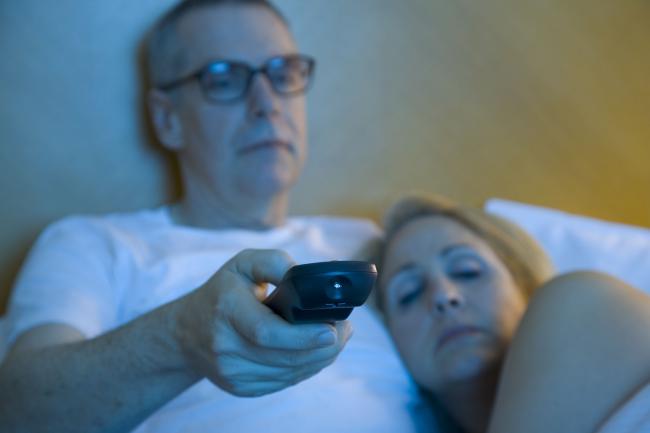Artificial light during sleep linked to obesity
June 18, 2019
Artificial light during sleep linked to obesity
At a Glance
- Researchers found that women who slept with a television or light on were more likely to gain weight and develop obesity.
- The findings suggest that turning off lights at bedtime could reduce the risk of becoming obese.

Sleep is important for many reasons. Your body produces hormones while you sleep that help your body grow, build muscle, fight illnesses, and repair damage. Not getting enough sleep can affect your mood, health, weight, and ability to carry out day-to-day activities.
Your body’s natural daily cycles are called circadian rhythms. They respond primarily to light and darkness. Sleeping at night and being awake during the day is an example of a light-related circadian rhythm.
A “master clock” in the brain helps coordinate your body’s natural rhythms. When there’s less light, your brain makes more of a hormone called melatonin, which makes you tired. Studies in animals suggest that being exposed to light at night may affect melatonin, leading to changes in circadian rhythms and weight gain from altered eating patterns.
People are exposed to light at night in many different ways, including from television, mobile devices, streetlights, and other sources of light. To investigate whether this light is linked with weight gain in people, a team led by Dr. Dale Sandler at NIH’s National Institute of Environmental Health Sciences (NIEHS) used data from over 43,000 women, aged 35–74 years, who were enrolled in a national study called the Sister Study. Results were published online on June 10, 2019, in JAMA Internal Medicine.
The women were asked whether they slept with no light, a small nightlight, light outside of the room, or a light or television on in the room. The researchers collected a variety of other information at the start of the study and after a follow-up period of an average of 5.7 years. This included the women’s weight, height, waist and hip circumference, and body mass index measurements at the start and information on weight at follow-up.
The researchers found that women who slept with a light or television on were more likely to be obese at the start of the study. They were also 17% more likely to have gained around 11 pounds or more over the follow-up period. The association with light coming from outside the room was more modest. Using a small nightlight wasn’t associated with any more weight gain than sleeping with no light.
“Although poor sleep by itself was associated with obesity and weight gain, it did not explain the associations between exposure to artificial light while sleeping and weight,” Sandler notes.
The authors couldn’t rule out all the other factors that might be linked with artificial light at night and weight gain. However, their findings didn’t significantly change when they adjusted for age, having an older spouse or children in the home, race, socioeconomic status, where they lived, calories consumed, nighttime snacking, physical activity, and sleep length and quality.
“Unhealthy high-calorie diet and sedentary behaviors have been the most commonly cited factors to explain the continuing rise in obesity,” says researcher Dr. Yong-Moon (Mark) Park. “This study highlights the importance of artificial light at night and gives women who sleep with lights or the television on a way to improve their health.”
Related Links
- Weekend Catch-Up Can’t Counter Chronic Sleep Deprivation
- How Disrupted Sleep May Lead to Heart Disease
- Sleep Deprivation Increases Alzheimer’s Protein
- Molecular Ties Between Lack of Sleep and Weight Gain
- How Sleep Clears the Brain
- About Sleep
- Sleep Deprivation and Deficiency
- Circadian Rhythms
- The Benefits of Slumber: Why You Need a Good Night’s Sleep
References
Association of Exposure to Artificial Light at Night While Sleeping With Risk of Obesity in Women. Park YM, White AJ, Jackson CL, Weinberg CR, Sandler DP. JAMA Intern Med. 2019 Jun 10. doi: 10.1001/jamainternmed.2019.0571. [Epub ahead of print]. PMID: 31180469.
Funding
NIH’s National Institute of Environmental Health Sciences (NIEHS).


